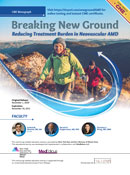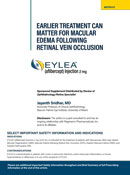Changes to PRP Code
First, the 2016 Current Procedural Terminology (CPT) revised code 67228 representing PRP to read:
Treatment of extensive or progressive retinopathy (e.g., diabetic retinopathy), photocoagulation.1
Before this year, the descriptor for CPT 67228 included the verbiage “one or more sessions.” Removing this descriptor facilitates charging for staged PRPs within the global period. Medicare Carrier Palmetto GBA discusses codes defined as “one or more sessions” accordingly:
These codes should be reported once for the defined global surgery period to include all sessions during that period. For example, when laser photocoagulation of diabetic retinopathy requires four sessions, CPT code 67228 should be reported once. This includes the surgery and appropriate follow-up, post-operative management, over the ensuing 90-day global surgery period.2
| Table: National Medicare Rates For Retinal Detachment Repair Codes | |||
| CPT | 2015 | 2016 | Change (%) |
| 67107 | $ 1,234.68 | $ 1,031.88 | -16% |
| 67108 | $ 1,631.02 | $ 1,315.81 | -19% |
| 67113 | $ 1,772.96 | $ 1,430.38 | -19% |
| 67228 | $ 1,016.20 | $ 345.15 | -66% |
Impact on the Practice
What does this mean to the practice? Now the surgeon may charge for each session of PRP. For example, if 800 laser pulses are delivered in session one and the patient returns three weeks later for a second session of 800 laser pulses in the same eye, both sessions can be reimbursed in full. In another example, when PRP was delivered to the right eye and subsequently delivered to the fellow eye within 90 days, the claims required modifier –79 representing an unrelated service. Now, modifier –79 is not necessary when PRP of the fellow eye is delivered outside the new 10-day global period.
Other Retinal Code Changes
The other two relatively common retinal laser procedures, CPT 67210 (focal laser) and CPT 67145 (prophylaxis for retinal detachment) did not change. They still include the “one or more sessions” designation and retain 90-day global periods.
Significant decreases in reimbursement rates for retinal detachment repair codes 67107, 67108 and 67113 occurred in 2016 as well3 (Table). Unfortunately, the reduction (excluding 67228) appears to be part of a two-year phase-in. This means we will likely see further reductions to codes 67107, 67108 and 67113 in 2017.4 Reimbursement rates for other common surgical services, such as intravitreal injections (67028) and vitrectomy membrane peels (67041, 67042), had little or no change in 2016.
New Code for Compounded Drugs
CMS released a new supply code for compounded drugs. According to MLN Matters Number MM9846, Health Care Procedure Coding System (HCPCS), code J7999 Compounded Drug, Not Otherwise Classified (NOC) is effective January 1, 2016, for compounded drugs.5 The Medicare Claims Processing Manual stipulates “beginning in July 2015, claims for compounded drugs shall be submitted using a compounded drug, not otherwise classified (NOC) HCPCS code.”6
Some Medicare carriers, like Noridian, mandate the use of J7999 for compounded bevacizumab (Avastin, Genentech).7 Some carriers, at the time this article was written, have not yet implemented J7999 for compounded drugs including bevacizumab and may still require other codes. We encourage you to monitor your claims and check the local carrier information for updates.
Other changes occurred in 2016, but none as immediately impactful to retinal surgeons. Continue to monitor your carriers for updates and changes to current policies and Local Coverage Determinations (LCDs). RS
Mr. Mack is a senior consultant with Corcoran Consulting Group. He can be reached at 1-800-399-6565 or at www.corcoranccg.com.
REFERENCES
1. 2016 Professional Edition CPT Current Procedural Terminology. Chicago, IL: American Medical Association; 2015.
2. Palmetto GBA. One or More Sessions: Global Surgery Period. Available at: http://www.palmettogba.com/palmetto/providers.nsf/DocsCat/Providers~JM%20Part%20B~Browse%20by%20Specialty~Optometry%20Ophthalmology~8EELJJ7408?open&navmenu=%7C%7C. Accessed January 20, 2016.
3. 2016 Medicare Physician Fee Schedule. RVU16A. Available at: https://www.cms.gov/Medicare/Medicare-Fee-for-Service-Payment/PhysicianFeeSched/PFS-Relative-Value-Files-Items/RVU16A.html?DLPage=1&DLEntries=10&DLSort=0&DLSortDir=descending. Accessed January 20, 2016.
4. Medicare Program; Revisions to Payment Policies Under the Physician Fee Schedule and other Revisions to Part B for CY 2016. CMS-1631-FC. Federal Register. November 16, 2015. Available at: https://www.federalregister.gov/articles/2015/11/16/2015-28005/medicare-program-revisions-to-payment-policies-under-the-physician-fee-schedule-and-other-revisions#h-89. Accessed January 20, 2016.
5. Department of Health and Human Services CMS. MLN Matters Number: MM9486. December 18, 2015. Available at: https://www.cms.gov/Outreach-and-Education/Medicare-Learning-Network-MLN/MLNMattersArticles/Downloads/MM9486.pdf. Page 12. Accessed January 20, 2016.
6. Drugs and Biologicals: Average Sales Price Payment Methodology. In: Centers for Medicare and Medicaid Services Medicare Claims Processing Manual. Available at: https://www.cms.gov/Regulations-and-Guidance/Guidance/Manuals/Downloads/clm104c17.pdf. Accessed January 20, 2016.
7. Noridian Health Care Solutions. Intraocular Bevacizumab Coding/Billing Guidelines. Available at: https://med.noridianmedicare.com/web/jeb/article-detail/-/view/10546/intraocular-bevacizumab-coding-billing-guidelines. Accessed January 20, 2016.



